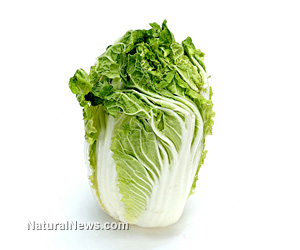
Five healthy vegetables you should be eating in winter
Thursday, November 14, 2013 by: Yanjun
Tags: vegetables, winter season, healthy foods
- Newly released JFK files reveal Pentagon's role in creating Lyme disease and covid in the same lab
- The hidden dangers in your kitchen: How cooking methods impact diabetes, cancer and aging
- DEADLY DECEPTION: How COVID vaccines increased mortality rates and why authorities hid the truth
- CDC finally halts $11 billion COVID funding scam as health officials admit the ‘pandemic’ was a fraud
- Arkansas embraces medical freedom with landmark ivermectin law
- GAIN-OF-FUNCTION CAT-BIRD-FLU now on the rise as nearly a dozen cats in Colorado "test positive" for Bird Flu due to contaminated cat food
- Lab leak confirmed? Boris Johnson's stunning reversal on COVID origins sparks global debate
- Home gardening for preppers: A beginner's guide to growing your own food
- Cartels shift tactics: Kidnappings and organ trafficking surge as border crossings plummet under Trump policies
- Trump's greatest betrayal so far: Accelerating Middle East wars, silencing dissent, and serving Zionist masters
- Why you should think twice before buying mainstream toothpaste formulas
- Was JFK's assassination orchestrated by a CIA double agent? New evidence points to James Angleton as the “architect”
- ATTENTION PRESIDENT TRUMP: Please WITHDRAW your nomination of Dr. Susan Monarez for CDC Director as she is a VAX FANATIC and TOXIC JAB ZEALOT
- Key nodes of Federal Government censorship
- Record honeybee deaths devastate U.S. agriculture, pesticides under scrutiny
- Speaker Johnson warns Congress may defund or disband rogue courts targeting Trump
- Paper or plastic? The environmental deception behind bag bans
- Judicial bias exposed: Judge who blocked Trump's gang deportations attended secretive left-wing conference
- Newly released JFK files reveal Pentagon's role in creating Lyme disease and covid in the same lab
- Elon Musk: Aliens could be here on Earth RIGHT NOW
- Festive flavors: The sweet history, nutritional profile and health benefits of pecan pie
- Trump reverses course on Gaza plan, says “nobody is expelling Palestinians”
- Reclaim your health: How midlife exercise reverses years of inactivity
- Big Pharma's $8 Billion bribery scheme exposed: how doctors are pushed to prescribe junk science, not heal
- Boys are back in town: Trump’s patriotic alpha crew takes the wheel while toxic females ride in the backseat
- EPA advisor admits the agency is funneling billions to climate groups ahead of Trump’s return to White House
- Space war brewing? Russia threatens to destroy Starlink satellites
- Survival 101: Effective EMF blocking techniques
- A lack of integrity in Academia: Harvard professor found GUILTY of fraudulent research to promote CRT theory
- Mike Adams Sermon 66: God will DESTROY ISRAEL for its wickedness
- 5 Simple steps to boost your brainpower: How to strengthen executive function in a distracted world
- Rep. Nancy Mace introduces bill to ban biological males from female facilities on federal property
- Sugarcane extract superior to cholesterol-lowering drugs?
- WHO focusing more on policing speech about public health and implementing global surveillance systems
- Pilots report mysterious lights 'moving at extreme speeds' across Oregon skies
- Dr. Mike Yeadon releases 15-minute testimony - WATCH - about genocidal intent of COVID “vaccines”
- EPA advisor admits the agency is funneling billions to climate groups ahead of Trump’s return to White House
- The Health Ranger releases “Vaccine Zombie” song and music video, using AI-animated zombies for the music video
- California's social media censorship law struck down: A victory for free speech or a threat to online safety?
- Dr. Mike Yeadon releases 15-minute testimony - WATCH - about genocidal intent of COVID “vaccines”
- The pandemic as a tool for INDOCTRINATION: Understanding “The Indoctrinated Brain” by Dr. Michael Nehls
- Florida takes a stand: DeSantis proposes permanent ban on mRNA vaccine mandates
- Mike Adams releases country western hit single: Goin’ Back in Time is Comin’ Home
- Mike Adams releases music poetry sensation: A Child of God
- “Why we influenced the 2020 elections”: Facebook files reveal the coordinated effort to bury the Hunter Biden laptop story
- RFK Jr. clears key hurdle: Sen. Susan Collins backs controversial HHS nominee, signaling a new era for health policy
- Unpacking the Lies That We’ve Been Fed – new song and music video released by Mike Adams, the Health Ranger
- Mike Adams releases new song and music video: Nothing More Disgusting Than a Globalist
- Newly released JFK files reveal Pentagon's role in creating Lyme disease and covid in the same lab
- Congratulations to the FULLY UNVACCINATED as you resisted the COVID-19 PROPAGANDA MACHINE fueled by over $100 BILLION
- Michigan sheriff announces criminal investigation into 2020 election crimes, Dominion Voting Systems
- Israeli soldiers accused of even more torture and abuse in the West Bank
- Migrants are taking advantage of recent hurricanes to scam residents and loot their homes
- House Intelligence Committee calls for the ARREST and PROSECUTION of Dr. Anthony Fauci
- Red Cross issues warning to stop blood plasma donations from vaccinated people
- Scientists confirm: GENIUS brain function can be spontaneously unleashed in humans without any apparent cause
- EPA advisor admits the agency is funneling billions to climate groups ahead of Trump’s return to White House
- HYSSOP: What research reveals about the health benefits of this ancient holy herb
- Two containers with completed ballots fall out of truck in Florida
- Fully vaccinated about to see “tsunami” of illness and death, warns virologist
- Global leaders unite to clamp down on “misinformation” with UN-backed Cascais Declaration
- BREAKING: 2025 NDAA authorizes mandatory military draft of WOMEN across America… as Pentagon pursues global NUCLEAR war with both Russia and China at the same time
- Michael Yon warns of a ZIONIST TAKEOVER in Trump’s second administration
- BOMBSHELL: DNA testing kits are a SCAM to develop ethnic-specific bioweapons
- Ozempic and Wegovy weight loss drugs are injectable LIZARD VENOM PEPTIDES that may unleash a devastating wave of organ failure… side effects align with symptoms of SNAKE BITES
- Israeli soldiers accused of even more torture and abuse in the West Bank
- These 13 countries just signed an agreement to engineer a global FAMINE by destroying food supply
- NASA admits that climate change occurs because of changes in Earth’s solar orbit, and NOT because of SUVs and fossil fuels
- RFK Jr. clears key hurdle: Sen. Susan Collins backs controversial HHS nominee, signaling a new era for health policy
- Sermon 30: How Jesus reveals Caesar’s FAKE CURRENCY and FALSE AUTHORITY
- Coriander seeds: Ancient medicine backed by modern science
- Arizona officials claim Maricopa County needs 10-13 days to tabulate results of the election
Here is a list of the five healthiest vegetables for winter.
1. Artichokes
Artichokes are an excellent source of fiber and vitamin C. It has also been said that artichokes can increase your bile flow and aid in your digestion. Before eating artichokes, you must first remove the prickly outer thorns. Artichokes may be fried or boiled. If you are boiling artichokes, you should avoid covering the pot of boiling water, because this allows acids in the vegetable to escape.2. Kale
Kale is packed full of beta-carotene, vitamin C, vitamin K and calcium. These vitamins and minerals have been known to control inflammatory processes, strengthen the immune system and even fight cancer! Kale is a form of cabbage and can be found in many varieties such as curly, dinosaur, Russian and ornamental. There are many different ways to prepare and eat kale. It may be boiled, sauteed, fried, steamed or served raw in salads. Oftentimes, kale is frozen before being used for cooking, because it is sweeter once exposed to frost. With all of the vitamins in one vegetable, eating kale is an excellent way to boost your daily intake of essential vitamins.3. Cabbage
Cabbage, also known as Brassica oleracea, may be found in various forms. There is red cabbage, cone cabbage and standard cabbage. It is considered an herbaceous flowering plant and is unique due to its short stem. It is often served raw in salads but can be cooked for soups, stews, stuffed cabbages etc. The great thing about cabbage is that it is full of vitamin B, vitamin C, calcium, magnesium, phosphorous, protein and zinc. These vitamins have been known to work as an anti-inflammatory which can help or prevent swelling in the body. It has also been known to aid with headaches, ulcers and skin diseases.4. Arugula
Arugula is a green leafy vegetable that is in the same family as broccoli, cauliflower and cabbage. It may be eaten raw or cooked. It is recommended by nutritionists to consume arugula cooked with a small amount of oil. The oil that you use to cook the arugula in contains fat which may help your body absorb the nutrients better. Arugula is full of vitamin A, vitamin C, vitamin K, calcium and iron. In addition to these great vitamins, it also has very low level of oxalate which can interfere with your body's ability to properly absorb nutrients. Arugula has been shown to prevent cancers and macular degeneration.5. Winter Squash
Winter squash is a category of vegetable that contains pumpkin, butternut, spaghetti and acorn squash. These are all full of high levels of carotene, vitamin C, vitamin B1, pantothenic acid, folic acid, fiber and potassium. These nutrients have been shown to protect the human body from cancer, diabetes and heart disease. Winter squash needs to be cooked. It may be steamed, boiled, baked or roasted.In conclusion, winter is a time that the body needs extra vitamins and minerals to protect it and help boost its immune system. By eating these five healthy vegetables, you can give your body the boost it needs to stay healthy and prevent future illness.
Sources for this article include:
http://www.motherearthnews.com
http://www.nutrition411.com
http://science.naturalnews.com
About the author:
Sofiya has written articles on most health-related topics, including traditional medicine, alternative and naturopathic and natural treatments,health insurance, wellness, medical marijuana, diets and fitness.
Vegetables at FETCH.news
Get independent news alerts on natural cures, food lab tests, cannabis medicine, science, robotics, drones, privacy and more.
Take Action: Support Natural News by linking to this article from your website
Permalink to this article:
Embed article link: (copy HTML code below):
Reprinting this article:
Non-commercial use OK, cite NaturalNews.com with clickable link.
Follow Natural News on Facebook, Twitter, Google Plus, and Pinterest
Science News & Studies
Medicine News and Information
Food News & Studies
Health News & Studies
Herbs News & Information
Pollution News & Studies
Cancer News & Studies
Climate News & Studies
Survival News & Information
Gear News & Information
News covering technology, stocks, hackers, and more



"Big Tech and mainstream media are constantly trying to silence the independent voices that dare to bring you the truth about toxic food ingredients, dangerous medications and the failed, fraudulent science of the profit-driven medical establishment.
Email is one of the best ways to make sure you stay informed, without the censorship of the tech giants (Google, Apple, Facebook, Twitter, YouTube, etc.). Stay informed and you'll even likely learn information that may help save your own life."
–The Health Ranger, Mike Adams












































